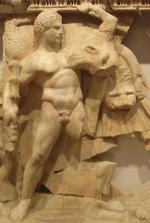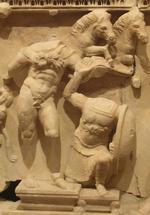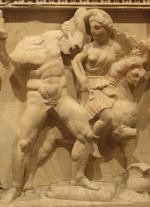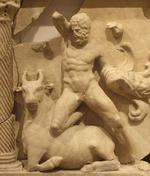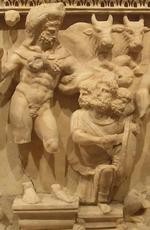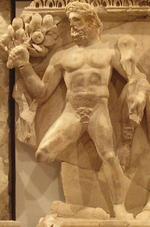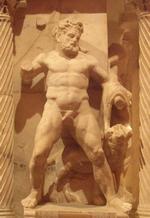
From Project Gutenberg's etext, The Golden Fleece and the Heroes Who Lived Before Achilles, by Padraic Colum
All pictures of Hercules on this page are from the Livius website and were made by Marco Prins and Jona Lendering. They come from the sarcophagus from Perge that is now at the archaeological museum of Alanya.
The Life And Labours Of Hercules
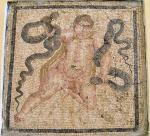
As Juno was always hostile to the offspring of her husband by mortal mothers, she sent two serpents to destroy him as he lay in his cradle, but the precocious infant strangled them with his own hands.
Hercules was the son of Zeus, but he was born into the family of a mortal king. When he was still a youth, being overwhelmed by a madness sent upon him by one of the goddesses, he slew the children of his brother Iphicles. Then, coming to know what he had done, sleep and rest went from him: he went to Delphi, to the shrine of Apollo, to be purified of his crime.
At Delphi, at the shrine of Apollo, the priestess purified him, and when she had purified him she uttered this prophecy: "From this day forth thy name shall be, not Alcides, but Hercules. Thou shalt go to Eurystheus, thy cousin, in Mycenae, and serve him in all things. When the labours he shall lay upon thee are accomplished, and when the rest of thy life is lived out, thou shalt become one of the immortals." Hercules, on hearing these words, set out for Mycenae.
He stood before his cousin who hated him; he, a towering man, stood before a king who sat there weak and trembling. And Hercules said, "I have come to take up the labours that you will lay upon me; speak now, Eurystheus, and tell me what you would have me do."
Eurystheus, that weak king, looking on the young man who stood as tall and as firm as one of the immortals, had a heart that was filled with hatred. He lifted up his head and he said with a frown:
"There is a lion in Nemea that is stronger and more fierce than any lion known before. Kill that lion, and bring the lion's skin to me that I may know that you have truly performed your task." So Eurystheus said, and Hercules, with neither shield nor arms, went forth from the king's palace to seek and to combat the dread lion of Nemea.
He went on until he came into a country where the fences were overthrown and the fields wasted and the houses empty and fallen. He went on until he came to the waste around that land: there he came on the trail of the lion; it led up the side of a mountain, and Hercules, without shield or arms, followed the trail.
He heard the roar of the lion. Looking up he saw the beast standing at the mouth of a cavern, huge and dark against the sunset. The lion roared three times, and then it went within the cavern.
Around the mouth were strewn the bones of creatures it had killed and carried there. Hercules looked upon them when he came to the cavern. He went within. Far into the cavern he went, and then he came to where he saw the lion. It was sleeping.
Hercules viewed the terrible bulk of the lion, and then he looked upon his own knotted hands and arms. He remembered that it was told of him that, while still a child of eight months, he had strangled a great serpent that had come to his cradle to devour him. He had grown and his strength had grown too.
The lion of Nemea
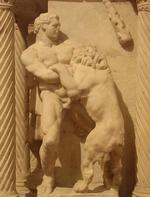
The beast was proof against all weapons, but Heracles
strangled it. From now on, he wore the lion's invulnerable pelt
as armour.
The Greeks celebrated Hercules' victory every two years: the
Nemean Games.
The Hydra
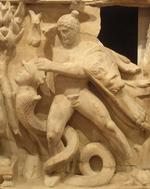
Every time Heracles cut off one head, two new heads grew in its place. Finally, he cut off the last, immortal head, which he buried alive.
After the battle, Heracles dipped his arrowheads in the monster's poisonous gall. As an archer, he was now invincible.
The Stables
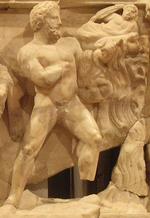
Hercules' had to clean the notorious stable of king Augias of Elis, in one day. He ignored the terrible stench and bravely started to carry the dung away, but there was simply too much of it.
The Birds
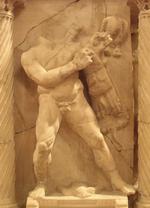
They had wings, claws and beaks of metal and were dedicated to the war god Ares.
Initially, Hercules' arrows were inadaquate, so the goddess Athena gave him a rattle that had been made by Hephaestus.
The Hind
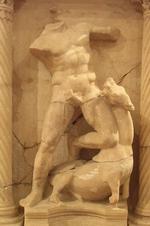
Larger than a bull, this terrible creature destroyed the northern Peloponnese. Hercules northernmost edges of the earth, where the legendary Hyperboreans lived, and finally overcame the animal, which he carried back home.
